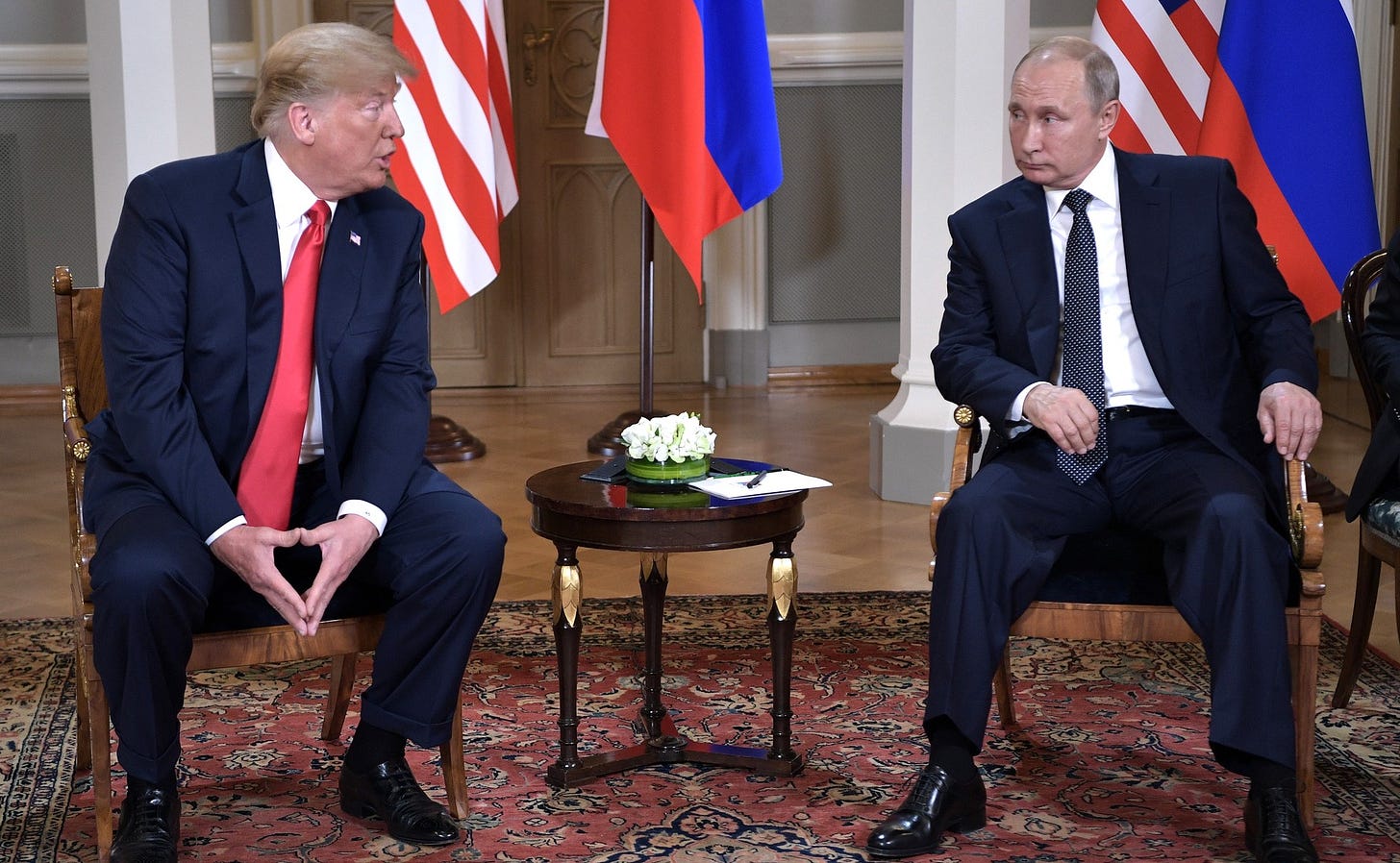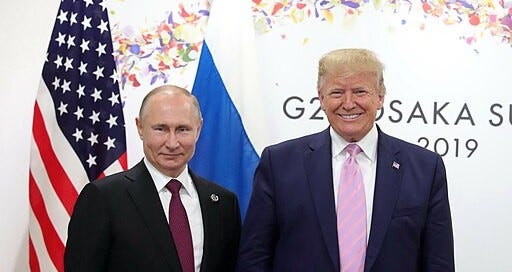Hegseth wants ‘warriors’ who are loyal to Trump
Will Trump order them to fight alongside Russians?
By Mike Sorrell
President Donald Trump has flipped American foreign policy. He sucks up to the authoritarian president of Russia and belittles the president of democratic Ukraine.
What will that sea change mean for the 3 million members of the U.S. armed forces led by commander in chief Trump?
Will they be asked to fight alongside Russians?
Where will they be told to go? What will they be ordered to do?
Will career men and women choose to get out now that the nation’s foreign affairs might lead to wars against former allies?
With the armed forces in a state of flux, what impact will that have on military recruitment?
Even before Trump cuddled up closer to Vladimir Putin, Trump indicated change will be coming to the military. He plans to expand the military’s domestic role. American soldiers could soon patrol American streets if that’s what Trump wants.
The Pentagon announced this weekend that about 3,000 additional active-duty soldiers will be added to the 4,200 already there along the 2,000-mile U.S. Mexican border. Governors have about 5,000 National Guard troops there, according to the Los Angeles Times.
The new federal troops will patrol in strykers, medium-sized armored personnel carriers. The Pentagon said the purpose of the active-duty federal troops is to “seal the border and protect the territorial integrity of the United States.” Secretary of State Marco Rubio said the Trump administration will not rule out the possibility of military attacks on Mexico.
In the five weeks since Trump became president, he has fired the chairman of the joint chiefs of staff and let Defense Secretary Pete Hegseth sack other top leaders of the armed forces, including military lawyers who advise on how to follow the laws of war.
On Friday, in a shocking power play that looked like a Mafia shakedown, Trump created a live-on-television spectacle that ended with Trump throwing Ukrainian President Vladimir Zelensky out of the White House.
“Friday, February 28, 2025, will go into the history books as one of the grimmest days in American diplomacy, the beginning of a long-term disaster that every American, every U.S. ally, and anyone who cares about the future of democracy will have to endure,” The Atlantic’s Tom Nichols wrote that afternoon. “With the White House’s betrayal of Ukraine capping a month of authoritarian chaos in America, [Russian President Vladimir] Putin, along with other dictators around the world, can finally look at Trump with confidence and think: one of us.”

A day earlier, five former defense secretaries sent a letter to Congress calling for open hearings into the firings of chairman of the Joint Chiefs of Staff, C.Q. Brown, and other senior officials sacked by Hegseth. The letter was signed by Lloyd Austin, Jim Mattis, Chuck Hagel, Leon Panetta and William Perry.
“We are deeply alarmed by President Trump’s recent dismissals of several senior U.S. military leaders. We write to urge the U.S. Congress to hold Mr. Trump to account for these reckless actions and to exercise fully its Constitutional oversight responsibilities,” the letter said.
Neither Trump nor Hegseth has explained why roughly a half-dozen high-ranking officers were fired. It is noteworthy that only one is a white male. Gen. Brown is a black man, and the others are either black men or black women.
Retention and recruitment will both suffer if Hegseth and Trump continue to give the message that only white males can expect to achieve success in the military. This past week the Pentagon said transgendered personnel will be removed from the ranks of the military.
Another factor in the recent firing of top leaders is that Trump only wants top leaders who are loyal to him, not necessarily to the Constitution. He made that clear during his first presidential administration when some military leaders balked at what he wanted them to do.
The five former defense secretaries also wrote, “President Trump’s actions undermine our all-volunteer force and weaken our national security. Talented Americans may be far less likely to choose a life of military service if they believe they will be held to a political standard. Those currently serving may grow cautious of speaking truth to power or they could erode good order and discipline by taking political actions in uniform. And the public’s traditionally high trust in the armed forces could begin to wither.”
In other words, some people will choose not to join a politicized military, and others will leave as soon as their terms of enlistment are up.
Hegseth has also fired the judge advocate generals (JAGS) for the Army and the Air Force; he intends to replace them. JAGS are lawyers who oversee the laws of war and advise officers all down through the ranks on what is and is not permissible in waging war.
Rosa Brooks, a professor at Georgetown Law School, wrote on X that Hegseth’s firing of JAG officers is “chilling.”
“It’s what you do when you’re planning to break the law: you get rid of any lawyers who might try to slow you down.”
Greg Jaffee of the New York Times has written that Hegseth has spoken repeatedly about the need to restore a “warrior ethos” to a military that he insists has become soft, social justice obsessed and more bureaucratic over the past two decades.
Hegseth’s replacement of the JAG officers “offers a sense of how he defines the ethos that he has vowed to instill,” Jaffee wrote.
Laws of war have been around a long time. “The law of war is part of who we are,” says the Department of Defense Law of War Manual, most recently updated in 2023.
Gen, George Washington said during the Revolution that he wanted the war “carried on agreeable to the rules which humanity formed.” His British counterpart agreed. During the American Civil War, President Abraham Lincoln ordered a code of war drafted that was later incorporated into the Geneva Conventions, international laws of war promulgated after World War II. The Geneva Conventions prohibit torture, restrict how prisoners of war are treated, protect civilians and set other humane standards.
One purpose of the laws of war is to enable soldiers to live with themselves when they get back home from war. A Ukrainian chaplain explained during a recent television interview that he stays on the battlefield to help Ukrainian soldiers “hold onto their humanity.” Soldiers are trained to kill, but not to step over the line into barbarity.
Hegseth, a former Fox News anchor, smooth-talked his way around questions by Maine Sen. Angus King during a January 14 confirmation hearing. King said Hegseth appeared to say that he believes in some rules, but not others, and that a combat situation might cause some rules to get set aside.
King asked if thought the Geneva Conventions should be followed.
“We follow rules,” Hegseth answered. “But we don't need burdensome rules of engagement that make it impossible for us to win these wars. And that's what President Trump understands.”
Hegseth wrote last year that U.S. troops engaged in battle need to be “the most ruthless, the most uncompromising, the most overwhelming lethal” force on the battlefield.
Trump became enamored with Hegseth while watching the man’s weekend program on Fox News. In 2019, the last year of Trump’s first administration, Hegseth kept up a steady drumbeat of calls for Trump to pardon two soldiers accused of war crimes who the military justice system prosecuted. Hegseth also called on Trump to reinstate a Navy Seal, who was charged with crimes in Iraq, including stabbing a teenaged Islamic State prisoner and taking a picture with the corpse.
Army Lieutenant Clint Lorance was one of the men pardoned by Trump in 2019 during his first presidential administration.
Lorance led a platoon that was part of the 82nd Airborne based in Afghanistan. Soldiers in that platoon got the Army to bring war crimes charges against Lorance. They said he ordered them, among other things, to open fire on three Afghan men standing beside a motorcycle; the men posed no threat. The soldiers then testified against Lorance when he was court martialed.
The Army convicted Lorance of second-degree murder and other charges and sentenced him to 19 years in prison.
The Washington Post reported that, “Senior Army lawyers did not agree with the decision to pardon Lorance, according to Pentagon officials. Among the most upset by the presidential pardon were the troops who served under him and made the difficult decision to accuse him of war crimes and testify at trial.”
Lucas Gray was one of the soldiers who served under Lorance and testified against him.
After Trump pardoned Lorance, Gray told the Post, “’I thought of the Army as this altruistic thing. I thought it was perfect and honorable. It pains me to tell you how stupid and naive I was.”
“’The Lorance stuff just broke my faith,” he said, adding: “And once you lose your values and your faith, the Army is just another job you hate.’”


